
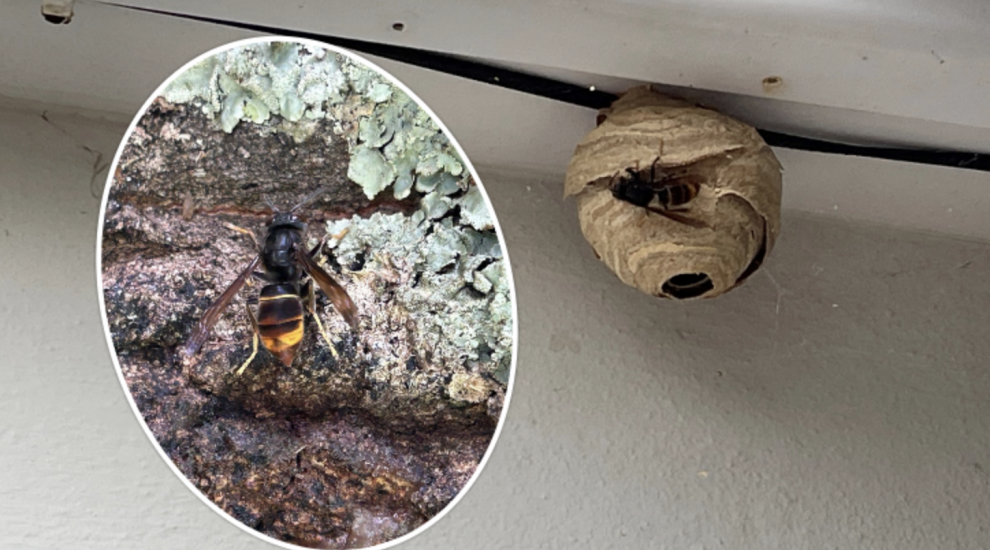

The amazing natural instincts Asian Hornets show in creating their nests and repopulating every year is matched only by the fatal risk they pose to people who may not even know they're allergic to stings.
Francis Russell is spending a fifth year co-ordinating the Bailiwick's response to the threat of Asian Hornets.
"I love insects, and although I don't like killing things, I have to justify what we're doing. It is actually right because all the non-native invasive species that come onto an island have an impact. Some have a very big impact, some not so big, but whether it's a plant, a crayfish, mosquito, if it's here and it shouldn't be here, it can lead to massive problems.
"If you think about environmental, human health and economic (threats), the Asian Hornet ticks all three boxes."
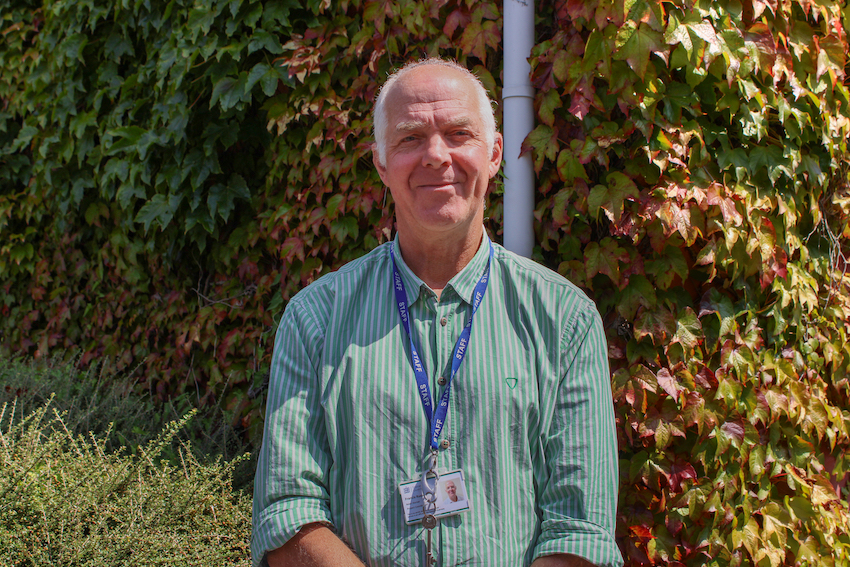
Pictured: Francis Russell, Co-ordinator of the Bailiwick's Asian Hornet Strategy.
"They're a top predator of all insects that they can catch. So, apart from Dragonflies and a few other things, there aren't any other insects in the Channel Islands that predate on all of our pollinators. They eat whatever they can catch.
"All of our pollinating insects are honeybees that people are really happy to have because they make honey; butterflies, wasps, flies...you might think 'Oh, that's great if they eat all the wasps', but over time if their numbers got out of control, each Hornet nest can take up to 11 kilogrammes of insects in a season. That's like 24 jars of jam equivalent weight of insects. They're just taking them out of the local environment.
"If you have that every year, eventually there's going to be a crash, so we have to look after our pollinating insects.
"The second thing was human health. These hornets sting because that's what they do to defend their nest, and it's what nature gave them as a very powerful device that says 'keep away'. So if you go too close to a nest, they will attack you. If you hit a nest accidentally, you'll get loads of them and this is a problem.
"Some people accidentally get stung by a single insect. This year we've had one person pruning who disturbed a small nest and got stung on the finger. He was just a bit sore the next day. In Jersey this year nine members of the public have had stings doing exactly the same thing. Somebody got seven stings and needed medical attention. So if you've got an allergy to wasp stings, that could be life threatening.
"It's frightening when you think in Spain, Portugal and France, people are dying from these Hornets every year. Nobody, luckily, not in the Channel Islands yet, but the problem is that in France, people are coming across hornets as part of their day to day lives."
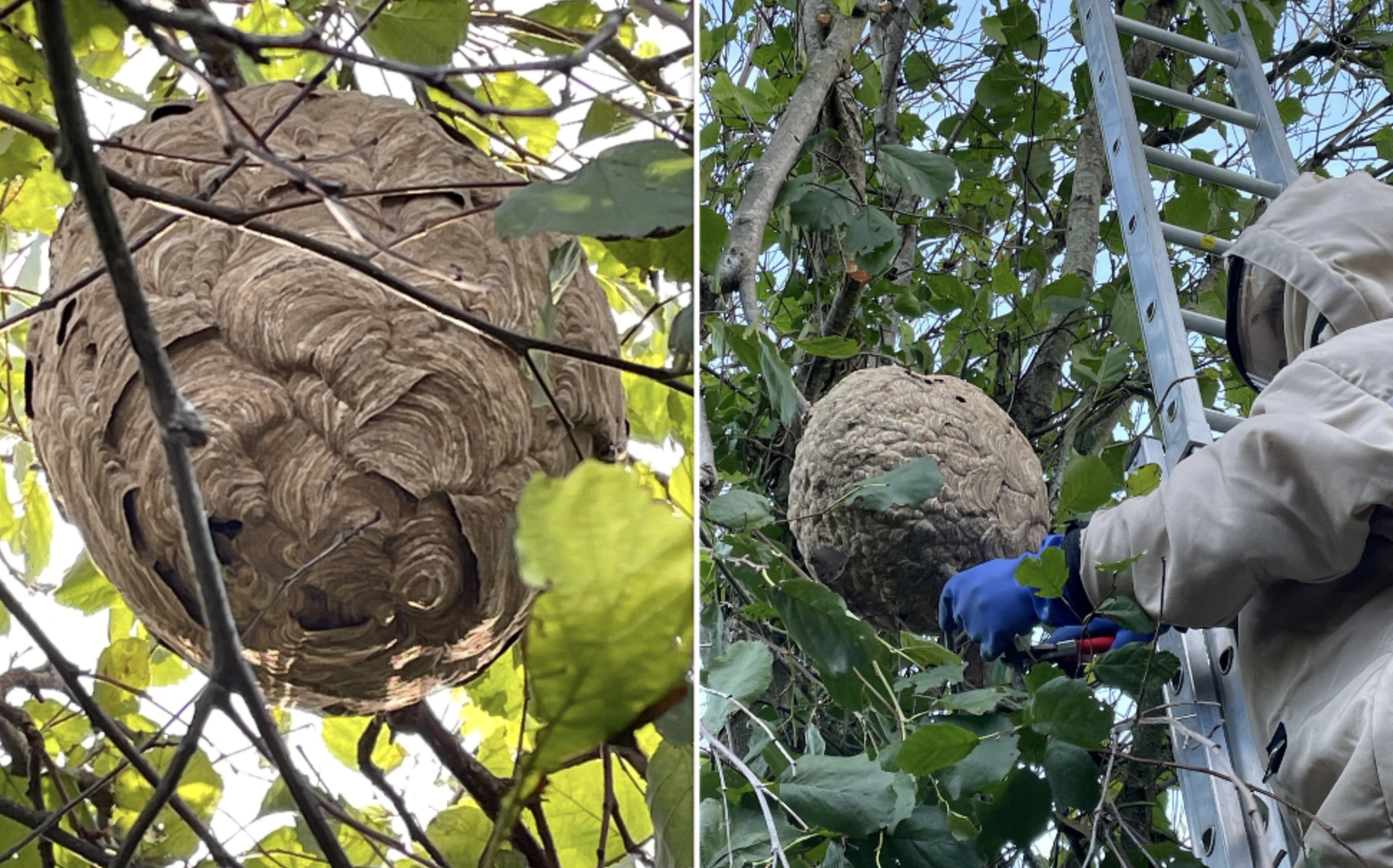
Pictured: So far this year nests have been suspected in the areas near the Imperial, the Co-op at Vazon, the Foulon Cemetery and Bordeaux.
"The third impact is if you have a hornet nest, people want something done about it. We provide that service because it's our job. In France, you have to pay for it yourself. You have to pay your pest controller, and that's a cost to the public.
"At the moment, here it's a cost to the States, which is relatively low because the numbers are so low. But if the numbers go up and up and up either the States keep paying for that, or at some point they'll say 'sorry, you're going to have to ring a pest controller'.
"If you've got grapes, soft fruit, if you keep bees, they will impact on your livelihood. So that's why the 'Track don't Trample' (campaign) goes back to the economic reasons."
The Track don't Trample campaign asks anyone who spots an Asian Hornet to report it - but not kill it.
The insects were first spotted in Guernsey in 2017 and since then Mr Russell and his colleague Damian have helped track worker hornets and chemically destroyed nests to prevent the hornets inside from repopulating and multiplying.
As Project Coordinator for the Asian Hornet strategy, Mr Russell said he is seeing more hornets crossing over from France every year.
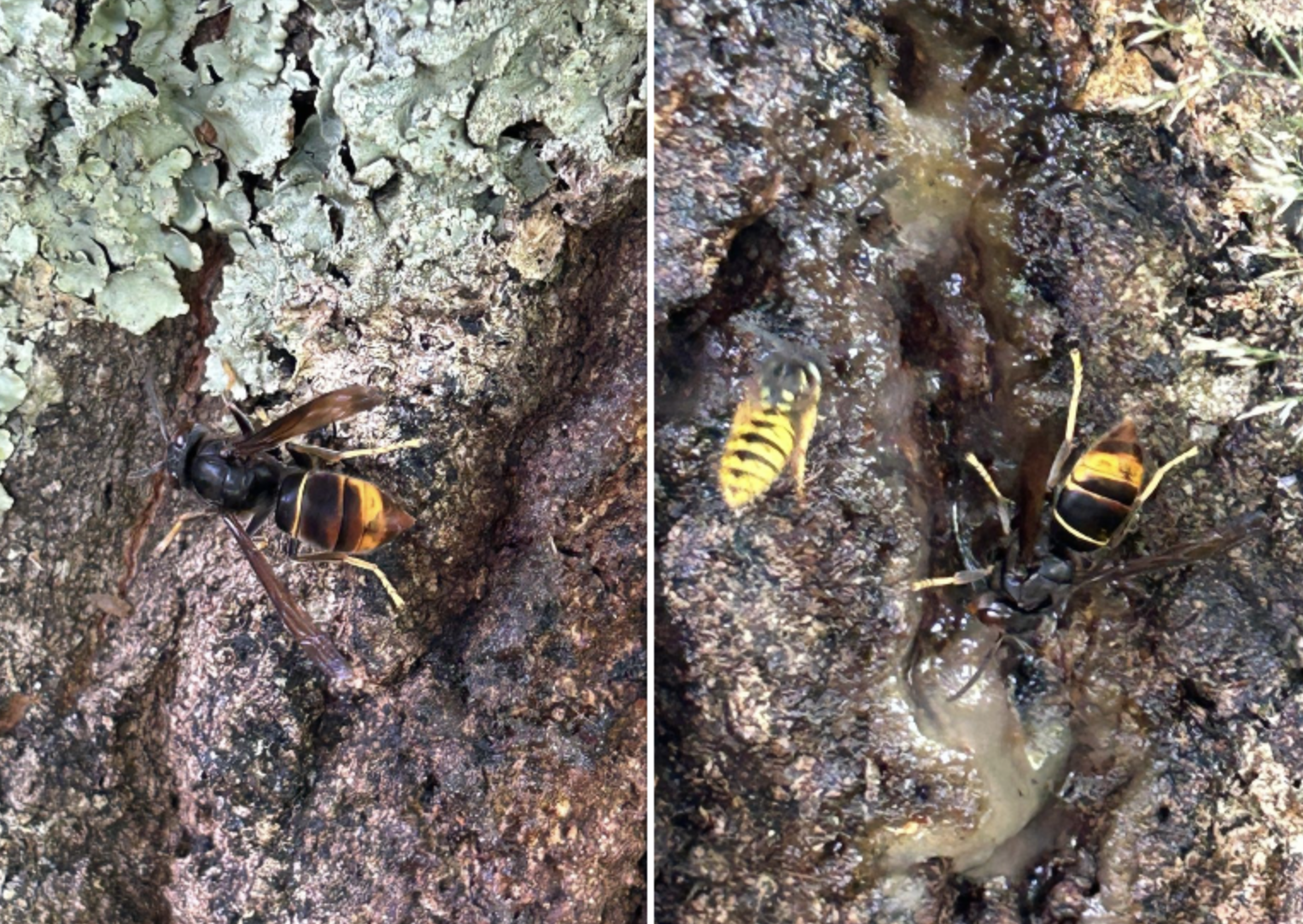
Pictured: The Asian Hornets above were spotted by a groundskeeper at the Foulon Cemetery.
"We're not going to eradicate them," he said. "We might do that on an annual basis, but they're always coming across. We know they fly here, which is impressive for a small insect. Also, they get brought over by people with boats and cargo, lorries and stuff.
"So every year since 2019, we've done the Spring Queening (campaign), which is phase one of the hornet control to catch the Queen Hornets. We put our little traps and we get volunteers to look after those."
The traps are spread across the island at 500m intervals with Asian Hornets spotted across the island - most recently near the Imperial, the Co-op at Vazon, the Foulon Cemetery and near Bordeaux.
The Queens won't be out of their nests now so Mr Russell said they are now trying to follow live worker Hornets who can lead them back to the nests.
"...typically they're within 500 metres of where we get Hornet sightings," Mr Russell said.
"...for each of those sightings that's been confirmed by a report from the public with a photograph, we suspect there'll be a nest not too far from those points where they're first seen. We then have to work on each one in turn and then systematically try to get nearer and nearer to that nest. It's a case of being patient being out there..."
Mr Russell said he receives numerous photos from members of the public who think they've seen an Asian Hornet, but the incorrect photos are all worth it when they can positively identify one.
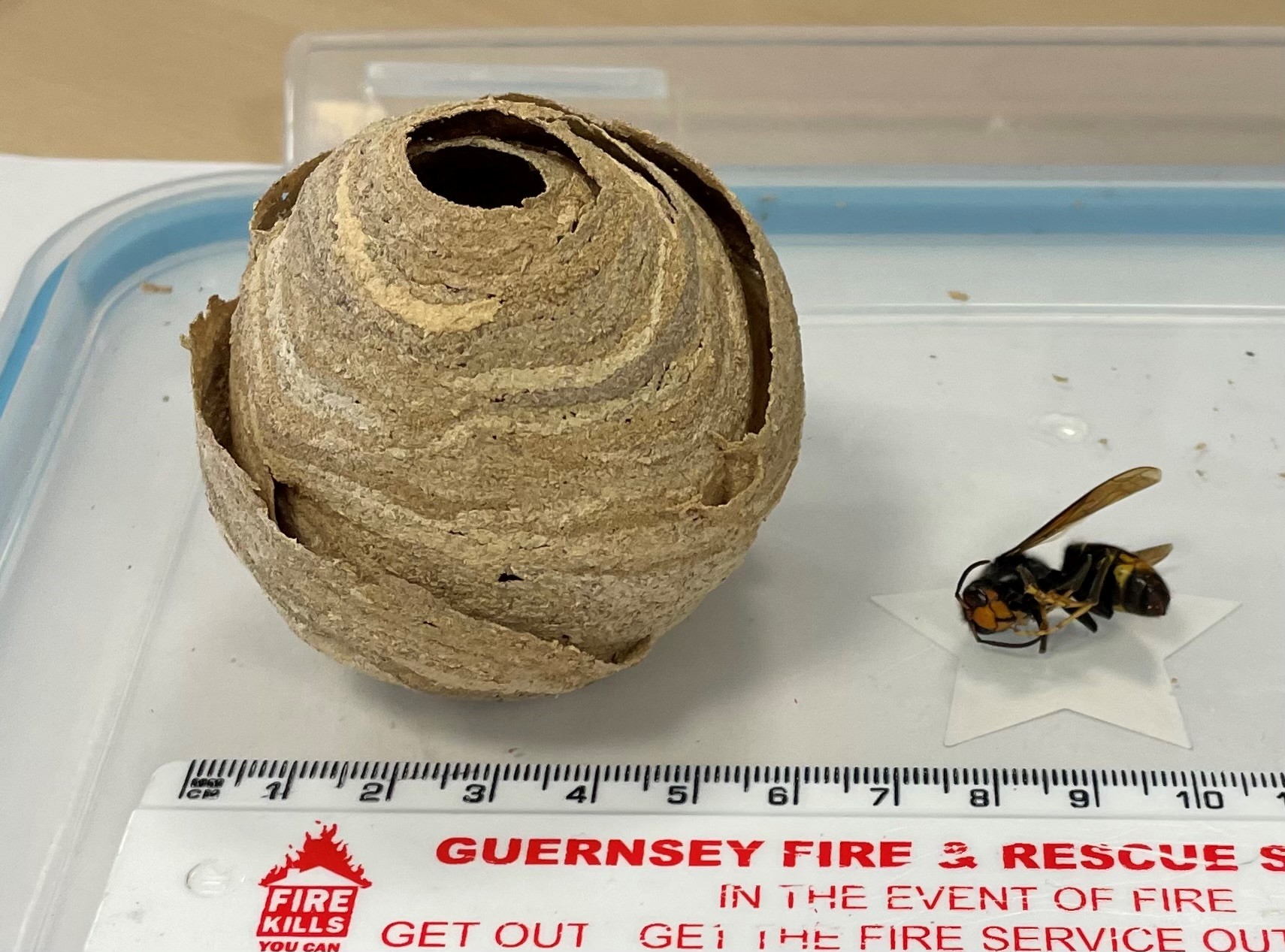
Pictured: Nests are destroyed once isolated so that the Hornets developing within it can be eradicated.
"I'm really happy that people have taken the effort because if people are not going to bother to report it, we're never going to find them. So I'm never annoyed or or frustrated.
"If people know that they should report something that looks a bit different, that's how we're going to catch the hornets. The challenge is to get people to know a little bit about what they're looking at. Roughly from the number of reports over the year, it's about 10% actually which tend to be correct, which is all right."
With around 100 - 200 worker hornets produced very early on in a nest's life cycle, they can multiply to 3 or 4,000. From each Queen, around 3 to 400 new Queens can develop and they will each populate their own nests.
"At its peak, you could get 3000 workers, and then there'll be about 1000 drones and then about 300 queens," said Mr Russell.
"We are the most skilled at identifying them and dealing with them, but we can't find Hornets. It's you guys that are out and about noticing something and phoning it in and by that collective community vigilance - it's a bit like a neighbourhood watch, but an Asian Hornet watch - so far we've managed to keep the numbers to a level where we think we can eradicate them every year.
"But this year there'll be more nests because we've had more queens. Just help us to carry on doing the good job that we're doing because it's working and Track don't Trample."
Number of captured Asian hornets doubles
Asian Hornet numbers kept in check
"Do not kill Asian Hornets - we need them alive to find the nest"
Efforts to stop "invasion" of Asian hornets
WATCH: Asian Hornets nest dissected
Comments
Comments on this story express the views of the commentator only, not Bailiwick Publishing. We are unable to guarantee the accuracy of any of those comments.